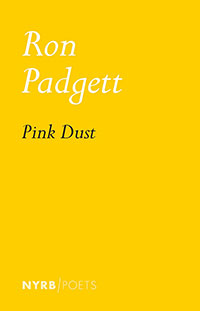 *
*
A H a n d p i c k e d P o e m
Review by Off the Shelf Correspondent Michael Todd Steffen
From his new book of poems, Pink Dust, in a section with the title Geezer, Ron Padgett writes,
It’s something of a relief
to fritter away a few hours
doing not much of anything
other than walking around
and looking at things
that aren’t in any way remarkable,
and to know
that, of the diminishing hours
left in your life,
you are frittering some away,
something you can’t remember
ever doing before,
relaxing into nothing in particular.
Like many of the “poems” in the book, this little meditation appears without a title. There are section headings throughout the book, announcing sequences. Pink Dust may be one long book-length poem with sections. It’s unannounced, another sign of blurring sequential and temporal definitions, a privileged work and view of a work and works for a laureate poet.
The poem appears on page 38 of the new book: 3 the mathematical whole number representing a circle; 8 the figure of the circuit of eternity: more, there’s more, onward, endless, like the meditation that feeds poetry, a discipline of attention where the unremarkable often comes into focus as remarkable. And, in this poem by Padgett, where the subject is frittering, “relaxing into nothing in particular,” where the (un)act of (no)concentration– “looking at things / that aren’t in any way remarkable”– becomes remarkable, catches our notice, tells me, in fact, how prone my mind is to busy-ness, how addicted I am to being intellectually proactive, even spurred onto it the more by the hum and light constantly in my back pocket or in the palm of my hand. Not only is it ruining my eyesight and posture (bent neck), it’s the source of a great deal of tension in my head, as in the belly after you’ve eaten too much. Sleep specialists tell us it’s a major source of widespread insomnia in our times.
When we’re ever looking at something made to be looked at, we omit silence, meditation, wandering, reflection. The gifts of frittering. We become an answer machine.
Like that, Padgett has, accidently or not, hit upon a general malaise of the times by merely setting out to confront a particular anxiety in his own life, in its “diminishing hours,” more and more discovering how open-ended writing is in the far field (Roethke) – more, onward – which leads simultaneously to a sense of the futility, the endlessness of it. What’s interesting is how frittering becomes a rebellion against that urgent sense of economizing these last precious moments. It is a poignant microcosmic moment, for a poet who has walked with John Ashbery and Kenneth Koch on the traces of high modernism and its sources in surrealism and dada, back to their seminal rejections, in the early 20th century, of the hyper stress brought to daily life by mechanical engineering and productivity-oriented Nationalism and Fascism– with their efforts to be rid of the unproductive, undesirable elements, doing what humans do most, and especially intellectuals, hanging around, having conversations, just being here.
In 2018, the Poetry Society of America awarded Padgett the Frost Medal, for a distinguished lifetime achievement in poetry. A busy intellectual lifetime, reaching further back than its first appearance in an avant-garde literary journal, The White Dove Review, in high school in Tulsa, Oklahoma. Between then and now, a staggering output of publications in prose and poetry (over 20 volumes now)—and awards, including an L.A. Times Book Prize, the Harold Morton Landon Translation Award, and the Chancellorship of the Academy of American Poetry from 2008 to 2015 – attest to the kind of restless, prolific literary life, the vigilant, upkeeping mind that could make a significant statement about the virtue of a couple hours of frittering.
Good poems don’t leave us silent. But they do much more than simply add to the chatter in our minds. The right words, mots justes, become a vehicle to remind us we’re consuming perhaps an awful lot of language; straining at its limits and ripe silences for genuine expression and meaning; expending, per-minute per-day, an awful lot of concentration. It’s good for us to zone out, back off, take a walk. Breathe, as the cognitive behavioral therapists remind us. Who of us, stepping out onto a crosswalk, isn’t potentially in a twilight zone? It’s something beyond the secular sense of things, in our sense however dim that might be of eternity. We’re all, on one level, in the same boat, aged 17, 26, 35, 52, 81 or 90. Life is mortal, we each feel its urgency, pine in its slags.
Anne Waldman nails the general feeling Padgett’s late writing, “masterful for its panoramic humanity and mind-stopping verbal wit, its breathtaking power and beauty. We want to stay with the person in these poems all day long.”
Pink Dust
poems by Ron Padgett
ISBN: 9781681379081
New York Review Books / Poetry, 2025
is available for $16 through The Grolier Poetry Bookshop
www.grolierpoetrybookshop.org
or from New York Review Books
207 E 32nd Street, New York, NY 10016
www.nyrb.com














